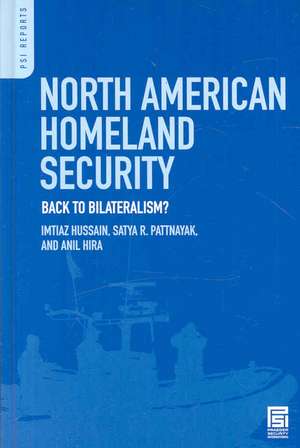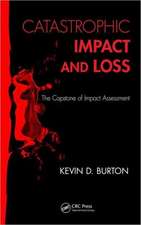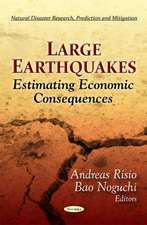North American Homeland Security: Back to Bilateralism?: PSI Reports
Autor Imtiaz Hussain, Satya R. Pattnayak, Anil Hiraen Limba Engleză Hardback – 29 oct 2008 – vârsta până la 17 ani
Din seria PSI Reports
- 35%
 Preț: 414.13 lei
Preț: 414.13 lei - 28%
 Preț: 412.88 lei
Preț: 412.88 lei - 28%
 Preț: 361.86 lei
Preț: 361.86 lei - 27%
 Preț: 376.91 lei
Preț: 376.91 lei - 28%
 Preț: 437.31 lei
Preț: 437.31 lei - 24%
 Preț: 412.88 lei
Preț: 412.88 lei - 28%
 Preț: 412.61 lei
Preț: 412.61 lei - 27%
 Preț: 376.58 lei
Preț: 376.58 lei - 27%
 Preț: 376.43 lei
Preț: 376.43 lei - 28%
 Preț: 438.17 lei
Preț: 438.17 lei - 27%
 Preț: 378.09 lei
Preț: 378.09 lei - 28%
 Preț: 437.75 lei
Preț: 437.75 lei - 24%
 Preț: 459.91 lei
Preț: 459.91 lei - 28%
 Preț: 459.91 lei
Preț: 459.91 lei - 28%
 Preț: 412.79 lei
Preț: 412.79 lei - 24%
 Preț: 459.51 lei
Preț: 459.51 lei - 28%
 Preț: 435.55 lei
Preț: 435.55 lei - 28%
 Preț: 375.66 lei
Preț: 375.66 lei - 24%
 Preț: 462.45 lei
Preț: 462.45 lei - 27%
 Preț: 360.03 lei
Preț: 360.03 lei - 14%
 Preț: 333.24 lei
Preț: 333.24 lei - 28%
 Preț: 437.40 lei
Preț: 437.40 lei - 27%
 Preț: 370.30 lei
Preț: 370.30 lei - 24%
 Preț: 462.45 lei
Preț: 462.45 lei - 24%
 Preț: 463.72 lei
Preț: 463.72 lei - 18%
 Preț: 322.02 lei
Preț: 322.02 lei - 18%
 Preț: 335.62 lei
Preț: 335.62 lei - 14%
 Preț: 337.61 lei
Preț: 337.61 lei - 27%
 Preț: 339.36 lei
Preț: 339.36 lei - 26%
 Preț: 348.26 lei
Preț: 348.26 lei
Preț: 379.88 lei
Preț vechi: 520.88 lei
-27% Nou
Puncte Express: 570
Preț estimativ în valută:
72.69€ • 76.09$ • 60.50£
72.69€ • 76.09$ • 60.50£
Carte tipărită la comandă
Livrare economică 01-15 aprilie
Preluare comenzi: 021 569.72.76
Specificații
ISBN-13: 9780313356865
ISBN-10: 0313356866
Pagini: 344
Dimensiuni: 156 x 235 x 29 mm
Greutate: 0.66 kg
Editura: Bloomsbury Publishing
Colecția Praeger
Seria PSI Reports
Locul publicării:New York, United States
ISBN-10: 0313356866
Pagini: 344
Dimensiuni: 156 x 235 x 29 mm
Greutate: 0.66 kg
Editura: Bloomsbury Publishing
Colecția Praeger
Seria PSI Reports
Locul publicării:New York, United States
Notă biografică
Imtiaz Hussain is Professor of International Relations at the Department of International Studies, Universidad Iberoamericana, Mexico City. His research and teaching interests range across the international relations spectrum, as have his publications. Originally from Bangladesh, he graduated from the University of Pennsylvania in Political Science, and has been at Universidad Iberoamericana since 1998.Satya R. Pattnayak is Professor of Sociology and Political Science and Director of Latin American Studies at Villanova University. Most recently, he has authored India as an Emerging Power (India Quarterly, 2007) and The Return of the State: Globalization, Capital, Coercion and Development (2006).Anil Hira is cross-appointed with Latin American Studies, and taught at the American University in Cairo and Tulane University before coming to Simon Fraser University. His research interests include international political economy, economic integration, energy deregulation, participatory governance, and fair trade. His geographical focus is on the MERCOSUR countries of South America. He is author of the books Ideas and Economic Policy in Latin America (1998) and Political Economy of Energy in the Southern Cone (2003).
Cuprins
NORTH AMERICAS 9/11 DILEMMA: PUZZLES, PAYOFFS, & THEINSTITUTIONAL/PROCEDURAL MATRIX:U.S. HOMELAND SECURITY & POST-9/11 NORTH AMERICAN INTEGRATION:ASYMMETRY SQUEEZING OUT TRILATERALISM?MEXICO and HOMELAND SECURITY:REVOLVING DOORS and TRANSIENTINTERESTS?CANADA-U.S. RELATIONS SINCE 9/11: PUTTING HUMPTY-DUMPTY BACKTOGETHER?POST-9/11 MEXICO-U.S. RELATIONS: GREEN PASTURES, ROUGH PATCHES,MUDDLED OUTCOMESCANADA, MEXICO, & HOMELAND SECURITY: ODDBALLS9/11, THEORY, & THE NORTH AMERICAN IDEA: TRILATERALISM ON TRIAL?CONCLUSIONS: NORTH AMERICAN TANGO: ONLY FOR TWOBIBLIOGRAPHY
Recenzii
Topics include how security considerations since the attacks of September 11, 2001, have impeded further economic integration.
This book is an interesting addition to the growing literature on the nature and effect of security alliances in an economically integrated world. The authors posit that security will trump economic integration for the US and that this reprioritization will increase conflict between social groups within and among states. Recommended. Graduate, faculty, and research collections.
How has the security regime established in the United States in the wake of the September 11th, 2001, terrorist attacks impacted trade and other relations between the United States, Canada, and Mexico? Hussain (international relations, U. Iberioamericana, Mexico), Pattnayak (sociology, Villanova U., US), and Hira (Latin American studies, Simon Fraser U., Canada) explore this question by first providing a country-specific study of 9/11 policy responses across North America, then examining the region's bilateral relations (particularly in reference to security and intelligence), and finally exploring trilateral possibilities. In exploring these issues, they rely on two major of clusters of theories: integrative (security and neofunctionalist) and hybrid (interdependence and neorealism).
This book is an interesting addition to the growing literature on the nature and effect of security alliances in an economically integrated world. The authors posit that security will trump economic integration for the US and that this reprioritization will increase conflict between social groups within and among states. Recommended. Graduate, faculty, and research collections.
How has the security regime established in the United States in the wake of the September 11th, 2001, terrorist attacks impacted trade and other relations between the United States, Canada, and Mexico? Hussain (international relations, U. Iberioamericana, Mexico), Pattnayak (sociology, Villanova U., US), and Hira (Latin American studies, Simon Fraser U., Canada) explore this question by first providing a country-specific study of 9/11 policy responses across North America, then examining the region's bilateral relations (particularly in reference to security and intelligence), and finally exploring trilateral possibilities. In exploring these issues, they rely on two major of clusters of theories: integrative (security and neofunctionalist) and hybrid (interdependence and neorealism).










